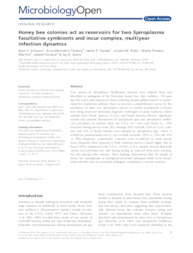Honey bee colonies act as reservoirs for two Spiroplasma facultative symbionts and incur complex, multiyear infection dynamics.
Honey bee colonies act as reservoirs for two Spiroplasma facultative symbionts and incur complex, multiyear infection dynamics.
Resumo: Two species of Spiroplasma (Mollicutes) bacteria were isolated from and described as pathogens of the European honey bee, Apis mellifera, ?30 years ago but recent information on them is lacking despite global concern to understand bee population declines. Here we provide a comprehensive survey for the prevalence of these two Spiroplasma species in current populations of honey bees using improved molecular diagnostic techniques to assay multiyear colony samples from North America (U.S.A.) and South America (Brazil). Significant annual and seasonal fluctuations of Spiroplasma apis and Spiroplasma melliferum prevalence in colonies from the U.S.A. (n = 616) and Brazil (n = 139) occurred during surveys from 2011 through 2013. Overall, 33% of U.S.A. colonies and 54% of Brazil colonies were infected by Spiroplasma spp., where S. melliferum predominated over S. apis in both countries (25% vs. 14% and 44% vs. 38% frequency, respectively). Colonies were co-infected by both species more frequently than expected in both countries and at a much higher rate in Brazil (52%) compared to the U.S.A. (16.5%). U.S.A. samples showed that both species were prevalent not only during spring, as expected from prior research, but also during other seasons. These findings demonstrate that the model of honey bee spiroplasmas as springtime-restricted pathogens needs to be broadened and their role as occasional pathogens considered in current contexts.
Ano de publicação: 2014
Tipo de publicação: Artigo de periódico
Unidade: Embrapa Gado de Leite
Observações
1 - Por padrão são exibidas publicações dos últimos 20 anos. Para encontrar publicações mais antigas, configure o filtro ano de publicação, colocando o ano a partir do qual você deseja encontrar publicações. O filtro está na coluna da esquerda na busca acima.
2 - Para ler algumas publicações da Embrapa (apenas as que estão em formato ePub), é necessário ter, no celular ou computador, um desses softwares gratuitos. Sistemas Android: Google Play Livros; IOS: iBooks; Windows e Linux: software Calibre.
Acesse outras publicações
Acesse a Base de Dados da Pesquisa Agropecuária (BDPA) para consultar o acervo completo das bibliotecas da Embrapa.

